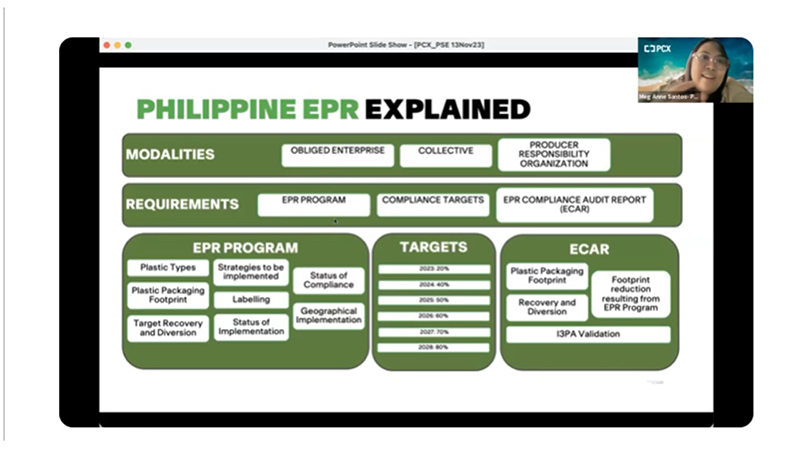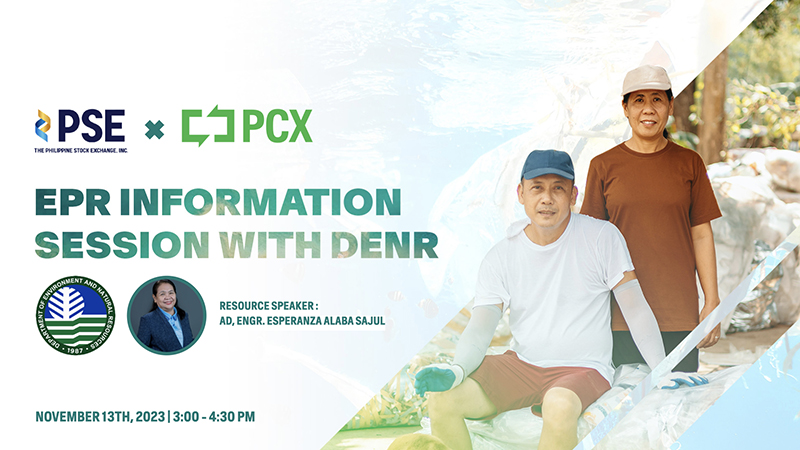“Does the new EPR law apply only to plastic manufacturers?” “Are companies in the Clark FreePort Zone exempt?” “Are there any tax incentives”
“Are we allowed to credit any excess recovery from 2023 to our 2024 plastic footprint?”

It’s been 11 months since regulations on how to implement Philippines’ new Extended Producer Responsibility (EPR) Law were unveiled. While many companies are making progress on plans to take responsibility for the plastic they put out into the world, many more are grappling with questions on who and what exactly is covered under the law, and how they can fulfil their obligations.
Republic Act (RA) 11898 or the Extended Producers Responsibility Act lapsed into law at the tail-end of the Duterte Administration. The landmark Philippine EPR Act compels large corporations to recover or divert at least 20 percent of their plastic packaging footprint by the end of 2023; then 40 percent by next year, and then increasing by 10 percent every year until at least 80 percent is recovered or diverted by 2028.
To help raise awareness, educate stakeholders and boost compliance with the EPR law, the Department of Environment and Natural Resources (DENR) teamed up with the Philippine Stock Exchange and PCX, a leading plastic responsibility platform, to host an ‘ask me anything’ webinar for listed companies. Executives from numerous publicly listed companies attended the event, which is part of an ongoing series of information and education programs conducted by DENR.
“The message today really revolves around the concept of what’s called a circular economy. And I say circular in the sense of sustainability,” said Atty. Roel Refran, Chief Operating Officer at The Philippine Stock Exchange. “We all know about the global warming problem, the climate risk, the physical pollution risk, and it’s for us to mitigate and to pass solutions and not just problems to the next generation.”
Engr. Esperanza Sajul, DENR-Environmental Management Bureau Assistant Director, assured that the DENR will exert every effort possible to help adapt and comply with the EPR law. The DENR information sessions include strategies that could be implemented within the EPR program, spanning from plastic footprint reduction to recovery and diversion, such as guidelines for retailers who want to set up product refilling systems for everything from groceries to soap and shampoo. Sajul addressed both upstream and downstream solutions, including plastic credits, in which a company can meet their recovery targets under the law, by funding organisations that collect post-consumer plastics from nature, and divert these to environmentally responsible processing methods and facilities.
The DENR-EMB executive also clarified that the law applies to all ‘obliged enterprises’, which are defined as companies who are brand owners or product manufacturers or importers who generate plastic packaging waste, with total assets of over Php 100 million, excluding land. This means that even companies in special economic zones have to comply with the law.To know if you are an Obliged Enterprise covered by the EPR law, click here.
“Currently, there are about 745 obliged enterprises that have submitted their EPR programs for evaluation by our office, either individually, collectively, or through their authorised Producer Responsibility Organization (PRO). We are expecting more to submit their programs as they become more aware of the modes of implementation available to them under the law,” Sajul said. To watch the EPR explainer video she shared, click here.
Meg Santos, Regional Sustainability Lead at PCX, which is classified by the DENR as a Producer Responsibility Organization, noted the company can support obliged enterprises across all aspects of their journey towards plastic responsibility, from assessing their plastic footprint to strategizing reduction programs, and to connecting them with an ecosystem of projects aimed at collecting, transporting and responsibly processing plastic waste.
“Let’s work together to find solutions – because like it or not, failure is not an option for us,” added Atty. Refran.




